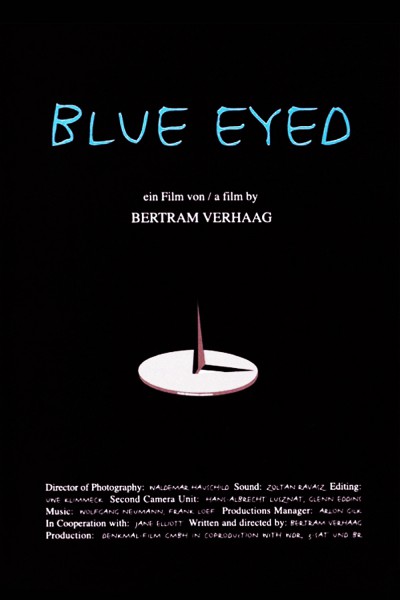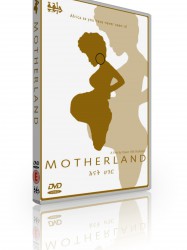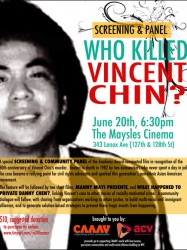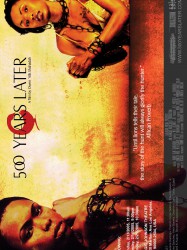Blue Eyed est un film de genre Documentaire
Blue Eyed (1996)

Si vous aimez ce film, faites-le savoir !
- Infos
- Casting
- Infos techniques
- Photos
- Vidéos
- Passages TV
- Citations
- Personnages
- Musique
- Récompenses
Durée 1h30
Genres Documentaire
Themes Le racisme, Documentaire sur la discrimination, Documentaire sur le droit, Documentaire sur une personnalité
Note81%










Blue Eyed is a 1996 documentary film by Bertram Verhaag in which Jane Elliott is teaching a workshop on racism.
She separates people regarding their eye color. The brown or green eye color people are considered to be superior to the blue eye color people. Through this division she creates a whole environment where educated adults, many times in position of power, even though being aware of taking part in a workshop, disagree, argue with each other and cry, not being able to cope or stand the situation in which they are put.
Jane Elliott argues that despite people considering themselves open and caring, they never know how deep is the repression and outcasting which they help to create by doing nothing against it and conforming with the current situation.
The documentary received the 1996 IDFA Audience Award.
Commentaires
Postez un commentaire :
Suggestions de films similaires à Blue Eyed
Il y a 8961 ayant les mêmes genres cinématographiques, 3221 films qui ont les mêmes thèmes (dont 195 films qui ont les mêmes 4 thèmes que Blue Eyed), pour avoir au final 70 suggestions de films similaires.Si vous avez aimé Blue Eyed, vous aimerez sûrement les films similaires suivants :

Anne Frank Remembered (1995)
, 1h57Genres Drame, Documentaire
Thèmes L'enfance, Le racisme, Religion, Documentaire sur la discrimination, Documentaire sur le droit, Documentaire sur la guerre, Documentaire historique, Documentaire sur une personnalité, Documentaire sur la religion, Politique, Religion juive, Documentaire sur la Seconde Guerre mondiale
Acteurs Kenneth Branagh, Glenn Close, Joely Richardson
Note80%






L'Afrique en morceaux (2000)
, 1h44Origine France
Genres Documentaire
Thèmes Afrique post-coloniale, Le racisme, Documentaire sur la discrimination, Documentaire sur le droit, Documentaire sur la guerre, Documentaire historique, Documentaire sur une personnalité, Documentaire sur la politique, Politique
Avril 1994 : génocide au Rwanda. 800 000 morts. Une catastrophe qui entraînera des déséquilibres dans toute la région. L’Afrique des Grands Lacs finit le siècle dans un bain de sang. Ce documentaire montre les intrigues, les coups d’éclat, les trahisons, les vengeances qui ont prévalu durant ces années avec pour seuls objectifs de conserver ou d’agrandir sa zone d’influence. C’est ainsi que cette décennie a vu s’envoler peu à peu tous les espoirs des populations. Espoirs d’une Afrique maîtresse de son destin, d’une autosuffisance alimentaire, de l’arrêt des conflits interethniques…

Luboml: My Heart Remembers (2003)
, 57minutesGenres Documentaire
Thèmes Le racisme, Religion, Documentaire sur la discrimination, Documentaire sur le droit, Documentaire sur la guerre, Documentaire historique, Documentaire sur une personnalité, Documentaire sur la religion, Politique, Religion juive, Documentaire sur la Seconde Guerre mondiale

Motherland (2010)
, 1h58Réalisé par Owen 'Alik Shahadah
Origine Etats-Unis
Genres Documentaire
Thèmes Afrique post-coloniale, Esclavagisme, Le racisme, Documentaire sur la discrimination, Documentaire sur le droit, Documentaire historique, Documentaire sur une personnalité, Documentaire sur la politique, Politique
Acteurs Harry Belafonte, Abdulkadir Ahmed Said
Note82%





Motherland is an epic documentary about the African continent from Ancient Egypt to the present. It is an overview of African history and contemporary issues but with the African people at the centre of the story. It is one of the first Pan-African features to be made.
 , 1h14
, 1h14Réalisé par Liz Garbus
Origine Etats-Unis
Genres Documentaire
Thèmes Politique, Le racisme, Documentaire sur la discrimination, Documentaire sur le droit, Documentaire historique, Documentaire sur une personnalité, Documentaire sur la politique, Politique
Note73%






Marion's Triumph (2003)
, 50minutesGenres Documentaire
Thèmes L'enfance, Le racisme, Religion, Documentaire sur la discrimination, Documentaire sur le droit, Documentaire sur la guerre, Documentaire historique, Documentaire sur une personnalité, Documentaire sur la religion, Politique, Religion juive, Documentaire sur la Seconde Guerre mondiale
Acteurs Debra Messing

Who Killed Vincent Chin? (1987)
, 1h27Origine Etats-Unis
Genres Documentaire, Historique, Policier
Thèmes Le racisme, Documentaire sur la discrimination, Documentaire sur le droit, Documentaire historique, Documentaire sur une personnalité
Note74%





On a summer night in Detroit, two white unemployed autoworkers fatally beat Vincent Chin, a 27-year-old Chinese engineer, with a baseball bat. The film tracks the incident from the initial eye-witness accounts through the trial and its repercussions for the families involved, and the American justice system at large. After an outcry from the Asian American community led by Vincent's mother Lily Chin, the case becomes a civil rights Supreme Court case. The case ends with tried killer Ronald Ebens let go with a suspended sentence and a small fee.
 , 30minutes
, 30minutesOrigine Etats-Unis
Genres Documentaire
Thèmes Le racisme, Documentaire sur la discrimination, Documentaire sur le droit, Documentaire sur une personnalité
In the mid-1940s, a tenant farmer named Gonzalo Mendez moved his family to the predominantly white Westminster district in Orange County and his children were denied admission to the public school on Seventeenth Street. The Mendez family move was prompted by the opportunity to lease a 60-acre (240,000 m) farm in Westminster from the Munemitsus, a Japanese family who had been relocated to a Japanese internment camp during World War II. The income the Mendez family earned from the farm enabled them to hire attorney David Marcus and pursue litigation.

As We Forgive (2008)
Genres Documentaire
Thèmes Afrique post-coloniale, Le racisme, Documentaire sur la discrimination, Documentaire sur le droit, Documentaire sur la guerre, Documentaire historique, Documentaire sur une personnalité, Documentaire sur la politique, Politique
The film tells the story of two Rwandan women who come face-to-face with the neighbors who slaughtered their families during the 1994 genocide, and their personal journeys toward forgiveness. Featuring in-depth interviews with both survivors and murderers, As We Forgive provides an intimate, first-hand view of the encounters between genocide perpetrators and their victims’ families.

500 Years Later (2005)
, 1h48Réalisé par Owen 'Alik Shahadah
Genres Documentaire
Thèmes Afrique post-coloniale, Esclavagisme, Le racisme, Documentaire sur la discrimination, Documentaire sur le droit, Documentaire historique, Documentaire sur une personnalité, Documentaire sur la politique, Politique
Acteurs Bill Cosby, M. K. Asante, Nelson George
Note68%





The film visits five continents, and over twenty countries while charting the legacy of slavery and identifies a direct, or indirect link to crime, drugs, HIV/AIDS, poor education, inferiority complex, low expectations, poverty, corruption, poor health, and underdevelopment to African people globally.
 Connexion
Connexion